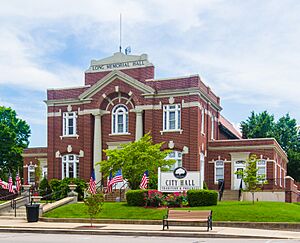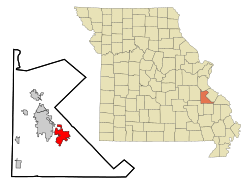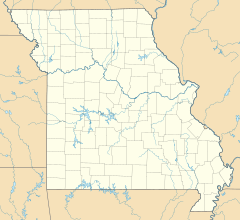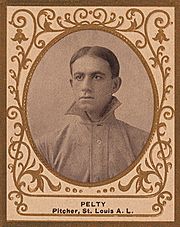Farmington, Missouri facts for kids
Quick facts for kids
Farmington, Missouri
|
|
|---|---|

Farmington, Missouri City hall, May 2019
|
|
| Motto(s):
Tradition and Progress
|
|

Location of Farmington, Missouri
|
|
| Country | |
| State | |
| County | St. Francois |
| Government | |
| • Type | City council |
| Area | |
| • Total | 9.55 sq mi (24.74 km2) |
| • Land | 9.49 sq mi (24.59 km2) |
| • Water | 0.06 sq mi (0.15 km2) |
| Elevation | 948 ft (289 m) |
| Population
(2020)
|
|
| • Total | 18,217 |
| • Density | 1,918.79/sq mi (740.85/km2) |
| Time zone | UTC-6 (Central (CST)) |
| • Summer (DST) | UTC-5 (CDT) |
| Zip Code |
63640
|
| Area code(s) | 573 |
| FIPS code | 29-23752 |
| GNIS feature ID | 2394749 |
| Website | http://farmington-mo.gov |
Farmington is a city in St. Francois County, Missouri. It is about 75 miles (121 km) southwest of St. Louis. Farmington is in the Lead Belt region. In 2020, about 18,217 people lived there. It is the main city of St. Francois County, also known as the county seat.
Farmington started in 1822. It was first called Murphy's Settlement. This name came from William Murphy of Kentucky. He first visited the area in 1798. When St. Francois County was formed, the town was briefly called St. Francois Court House. Later, it was renamed Farmington.
Contents
History of Farmington
William Murphy traveled from Kentucky to this area in 1798. At that time, it was part of La Louisiane and was ruled by Spain. Murphy was looking for a good place for his family to live. A local Native American, probably from the Osage tribe, helped him find a spring.
Murphy decided this was a great spot to settle. He received a special land grant from the Spanish government. This allowed him and his family to start a community near the St. Francois River.
William Murphy died on his way back to Kentucky. His wife, Sarah, and their grown sons continued his plan. They established the settlement around 1800. They named it Murphy's Settlement. Sarah Murphy started the first Protestant Sunday School west of the Mississippi River. Spanish law only allowed Roman Catholic religious services. So, Sarah and her students had their classes in secret.
The United States bought this land in 1803. This was part of the Louisiana Purchase. Later, it became part of the Missouri Territory. A post office opened in Murphy's Settlement in 1817.
Missouri became a state in 1821. This happened as part of the Missouri Compromise. In 1822, William Crawford Murphy gave 52 acres (21 hectares) of his land. This land was used for the county seat of the new St. Francois County.
Murphy's Settlement was renamed Farmington in 1825. The new name came from the rich farm land in the area. Farmington officially became a town in 1836. It became a village 20 years later, in 1856.
In the mid-1800s, Farmington grew a lot. This was because of the Plank Road. This road went from Pilot Knob to Ste. Genevieve. It made it easier for the village to get supplies and sell goods.
The road helped move supplies from river shipping places to the mines. It also moved iron ore from the mines to the shipping places. Later, the St. Louis, Iron Mountain and Southern Railway took over this route.
The first public school was built in 1870. In 1879, Farmington became a fourth-class city. In 1981, it became a third-class city.
Several historic places in Farmington are listed on the National Register of Historic Places. These include the Courthouse Square Historic District and the East Columbia Historic District.
Geography and Climate
Farmington is located at coordinates 37°46′55″N 90°25′20″W. The city covers a total area of about 9.39 square miles (24.32 square kilometers). Most of this area, 9.35 square miles (24.22 square kilometers), is land. Only a small part, 0.04 square miles (0.10 square kilometers), is water.
Farmington's Weather
The weather in Farmington changes throughout the year. The chart below shows the average temperatures and rainfall. These averages are based on data from 1991 to 2020.
| Climate data for Farmington, Missouri (1991–2020 normals, extremes 1906–present) | |||||||||||||
|---|---|---|---|---|---|---|---|---|---|---|---|---|---|
| Month | Jan | Feb | Mar | Apr | May | Jun | Jul | Aug | Sep | Oct | Nov | Dec | Year |
| Record high °F (°C) | 79 (26) |
88 (31) |
94 (34) |
93 (34) |
97 (36) |
106 (41) |
111 (44) |
114 (46) |
107 (42) |
96 (36) |
84 (29) |
76 (24) |
114 (46) |
| Mean daily maximum °F (°C) | 42.8 (6.0) |
47.9 (8.8) |
57.8 (14.3) |
68.7 (20.4) |
77.0 (25.0) |
84.8 (29.3) |
88.5 (31.4) |
87.7 (30.9) |
80.7 (27.1) |
70.0 (21.1) |
56.7 (13.7) |
46.4 (8.0) |
67.4 (19.7) |
| Daily mean °F (°C) | 32.7 (0.4) |
36.8 (2.7) |
46.0 (7.8) |
56.5 (13.6) |
65.5 (18.6) |
73.7 (23.2) |
77.7 (25.4) |
76.3 (24.6) |
68.5 (20.3) |
57.4 (14.1) |
45.6 (7.6) |
36.4 (2.4) |
56.1 (13.4) |
| Mean daily minimum °F (°C) | 22.6 (−5.2) |
25.8 (−3.4) |
34.3 (1.3) |
44.3 (6.8) |
54.1 (12.3) |
62.7 (17.1) |
66.9 (19.4) |
64.9 (18.3) |
56.2 (13.4) |
44.8 (7.1) |
34.4 (1.3) |
26.4 (−3.1) |
44.8 (7.1) |
| Record low °F (°C) | −23 (−31) |
−19 (−28) |
−11 (−24) |
16 (−9) |
27 (−3) |
39 (4) |
42 (6) |
38 (3) |
27 (−3) |
16 (−9) |
−6 (−21) |
−17 (−27) |
−23 (−31) |
| Average precipitation inches (mm) | 2.58 (66) |
2.78 (71) |
3.81 (97) |
5.26 (134) |
5.49 (139) |
3.55 (90) |
4.28 (109) |
3.82 (97) |
3.18 (81) |
3.27 (83) |
4.18 (106) |
2.96 (75) |
45.16 (1,147) |
| Average snowfall inches (cm) | 2.7 (6.9) |
2.1 (5.3) |
1.0 (2.5) |
0.0 (0.0) |
0.0 (0.0) |
0.0 (0.0) |
0.0 (0.0) |
0.0 (0.0) |
0.0 (0.0) |
0.0 (0.0) |
0.1 (0.25) |
2.8 (7.1) |
8.7 (22) |
| Average precipitation days (≥ 0.01 in) | 7.7 | 7.8 | 10.4 | 11.3 | 12.7 | 9.8 | 9.3 | 8.6 | 7.7 | 8.1 | 8.5 | 8.9 | 110.8 |
| Average snowy days (≥ 0.1 in) | 1.6 | 1.5 | 0.8 | 0.0 | 0.0 | 0.0 | 0.0 | 0.0 | 0.0 | 0.0 | 0.2 | 1.2 | 5.3 |
| Source: NOAA | |||||||||||||
People of Farmington
Farmington is part of a larger area called the Farmington Micropolitan Statistical Area. This area includes St. Francois County and Washington County. In 2010, this larger area had a population of 90,554 people. Farmington is also part of Greater St. Louis.
| Historical population | |||
|---|---|---|---|
| Census | Pop. | %± | |
| 1870 | 393 | — | |
| 1880 | 608 | 54.7% | |
| 1890 | 1,394 | 129.3% | |
| 1900 | 1,778 | 27.5% | |
| 1910 | 2,613 | 47.0% | |
| 1920 | 2,685 | 2.8% | |
| 1930 | 3,001 | 11.8% | |
| 1940 | 3,738 | 24.6% | |
| 1950 | 4,490 | 20.1% | |
| 1960 | 5,618 | 25.1% | |
| 1970 | 6,590 | 17.3% | |
| 1980 | 8,270 | 25.5% | |
| 1990 | 11,598 | 40.2% | |
| 2000 | 13,924 | 20.1% | |
| 2010 | 16,240 | 16.6% | |
| 2020 | 18,217 | 12.2% | |
| U.S. Decennial Census 2020 | |||
2020 Census Information
The 2020 United States census counted 18,217 people in Farmington. There were 6,586 households and 4,014 families. A household is a group of people living together. The population density was about 1,920 people per square mile (741 people per square kilometer).
Most people in Farmington are white (87.02%). There are also black or African-American people (5.76%), Asian people (1.37%), and Native American people (0.35%). About 4.9% of people are from two or more races. Hispanic or Latino people make up 1.8% of the population.
About 26.2% of households had children under 18 years old. Many households (44.6%) were married couples living together. About 32.0% of all households had only one person living there. The average household had 2.3 people.
The median age in Farmington was 38.3 years. This means half the people were younger than 38.3, and half were older. About 20.7% of the population was under 18. And 18.3% were 65 years or older.
The median household income was about $44,093. This is the middle income for all households. About 16.4% of the population lived below the poverty line. This includes 19.1% of those under 18.
Religious Beliefs
About 51.21% of people in Farmington say they are religious. Most of these people are Christians. About 38.08% are Protestants, and 7.65% are Roman Catholics. Other Christian faiths make up 5.03%. A small number of people belong to other religions like Mormons, Eastern religions, or Judaism.
Farmington's Economy
Farmington has several important employers. These include an SRG Global manufacturing plant and U.S. Tool. Other big employers are BJC Parkland Health Center, Centene Corp, the Farmington Correctional Center, and Southeast Missouri Mental Health Center. These businesses provide many jobs for the people in Farmington.
Education in Farmington
Public Schools
The Farmington R-VII School District serves the city's public school students. This district has several schools:
- Five elementary schools
- One public intermediate school
- One middle school
- One high school
In the 2008–2009 school year, there were 3,743 students and 306 teachers in the district. The school colors are black and gold. The mascot is the knight (or knightette for girls).
Students can join many sports teams, including:
- Boys' and girls' basketball
- Cross country
- Soccer
- Swimming
- Tennis
- Track
- Boys' baseball
- Golf
- Football
- Wrestling
- Girls' softball
- Girls' volleyball
Other activities include:
- Band (marching, jazz, and concert)
- Cheerleading
- Colorguard
- Winter guard
- Dance team
- FFA
- AFJROTC
- TSA
- FBLA
Here are the public schools:
- Jefferson Elementary
- Lincoln Intermediate
- Roosevelt Elementary
- Truman Kindergarten
- Washington-Franklin Elementary
- W.L. Johns Early Childhood Center
Here are the secondary schools:
- Farmington Middle School
- Farmington Senior High School
- Juvenile Detention Center
- Midwest Learning Center
Private Schools
Farmington also has private schools:
- St. Joseph Catholic School (Pre-Kindergarten to 8th grade)
- St. Paul Lutheran School (Pre-Kindergarten to 8th grade)
- St. Paul Lutheran High School (9th to 12th grade)
Public Library
The Farmington Public Library is a place where people can borrow books and other materials.
Fun Things to Do in Farmington
Farmington has a great park system for outdoor fun.
- Major parks include Engler Park, Wilson-Rozier Park, and Trimfoot Park.
- St. Joe State Park is just outside the city. It's a popular spot for ATV riders, campers, horseback riders, bicyclists, and swimmers. The park also has an outdoor gun range.
How to Get Around
Farmington is located where two main roads meet: US 67 and Missouri Highway 32. This makes it easy to travel to and from the city.
Famous People from Farmington
Many notable people have connections to Farmington:
- Sam Agnew, a Major League Baseball catcher
- Jake Arrieta, a Major League Baseball pitcher and winner of the 2015 NL Cy Young Award
- Herbert Asbury, a writer born in Farmington
- Ed Blaine, a former NFL player
- Jesse McI. Carter, a United States Army major general in World War I
- Walter Lewis Hensley, a US Representative
- Andrew Conway Ivy, a physiologist
- Tim Lollar, a Major League Baseball pitcher
- Lloyd McBride, a labor leader
- James Robinson McCormick, a US Representative
- Greggory Nations, a writer and co-producer for the TV series Lost
- Dan Peek, a founding member of the band America
- Barney Pelty, a Major League Baseball pitcher
- Kyle Richardson, an NFL punter and member of the Baltimore Ravens
- Charles E. Sebastian, a Mayor of Los Angeles
- Alex White, a professional mixed martial artist in UFC
- J. Ernest Wilkins Sr., an attorney and undersecretary of labor
- Robert Moore Williams, a writer
See also
 In Spanish: Farmington (Misuri) para niños
In Spanish: Farmington (Misuri) para niños




